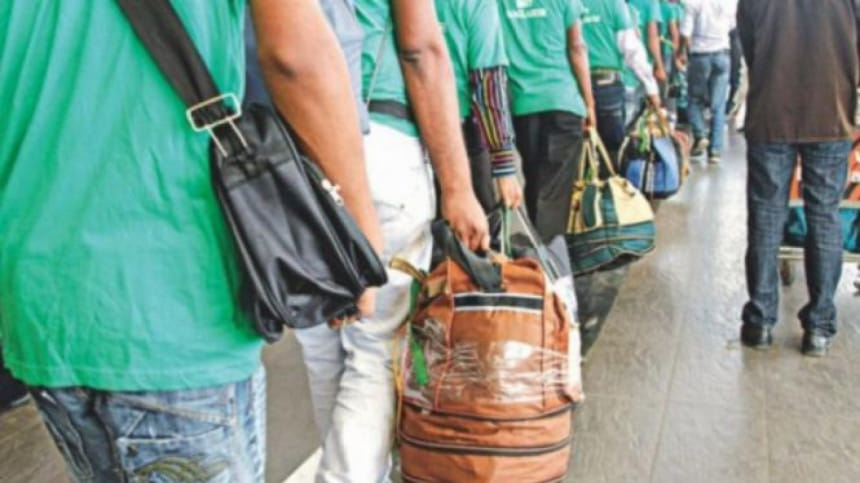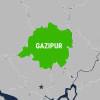Migrants’ eid this year: Hope back after Covid horror

After a severe dip in his earnings in the last two years of the pandemic, Hajrat Ali, a migrant worker in Malaysia, is very happy this time as he sent home an additional amount for his family's Eid celebration.
"Although I usually remit Tk 40,000 to Tk 50,000 a month, I have sent additional Tk 40,000 so my family can take Eid preparations well," Ali said in a WhatsApp call recently.
Around the same time last year, the 49-year-old from Rangpur's Gangachara upazila struggled to send regular monthly expenses to his family. He even had to borrow Tk 20,000 from his superior in Malaysia, and sent the money home ahead of Eid-ul-Fitr.
Things are better now as he is receiving the regular wage with the improved pandemic situation in the Southeast Asian country.
"I hope for a better Eid festival this time," said Ali.
Mohammad Musa, a Bangladeshi businessman in the United Arab Emirates, said although the Covid-19 situation has improved, many Bangladeshis are yet to fully recover their losses incurred during the pandemic.
A community leader of the UAE's Ras Al-Khaimah, Musa said Bangladeshi expatriates would be able to send more money home than last year as noticed in the trend.
With the global pandemic situation eased significantly, Bangladeshi expatriates, most of whom are low-paid migrant workers in the Middle East and Southeast Asia, are hoping for a better Eid celebration this year, leaving behind the pandemic-induced economic horror.
Bangladesh saw an increase in inward remittance in March ahead of the Arabic fasting month of Ramadan.
More than one crore Bangladeshis live in over 160 countries, according to government estimates. They send remittance -- which is not only ensuring survival of their families but also considered a key pillar of the country's economy.
The country received $1.85 billion in remittance in March this year, shows Bangladesh Bank data. The monthly amount is the highest after July last year when $1.87 billion inward remittance was received.
As of April 21, Bangladeshi expatriates sent home $1.40 billion in remittance, says central bank data. Experts had said the high remittance inflow is likely to continue till Eid-ul-Fitr.
In April last year, the total remittance was $2.06 billion.
In the first nine months of the ongoing fiscal year, Bangladesh received $15.30 billion in remittance, which, however, is a decrease of 21.56 percent compared to the same period a year ago.
Noted economist Prof Mustafizur Rahman said usually a spike in inward remittance could be seen in the month ahead of Eid -- which was anticipated for this year as well.
"The tendency continues," he said, adding that the overall remittance inflow has dropped but there are other reasons for the decline.
The country saw a spike in inward remittance last year after many returnees brought along their savings home. Besides, remittance inflow shifted from informal channel to formal channel amid the pandemic, said Prof Mustafizur, a distinguished fellow at think-tank Centre for Policy Dialogue.
He said Bangladeshi expatriates have more or less come out of the setback they faced amid the pandemic.
In the first three months of this year, 3.22 lakh Bangladeshis have gone overseas for jobs, says Bureau of Manpower, Employment and Training (BMET) data. The government is expecting about a million workers will have overseas employment this year.
Prof Mustafizur said Bangladesh could even receive a higher remittance in 2023-2024 than the $24.77 billion the country received in 2020-2021 as a large number of migrant workers are going abroad and will start sending remittance in a year after settling down.
MS Shekil Chowdhury, chairperson of Centre for NRB, a non-profit organisation of non-resident Bangladeshis, said to some extent, Bangladeshi expatriates in different Western and Arab countries are "relieved" now compared to their "tensed" situation amid the pandemic in the past two years.
Their income has increased from what they were earning in the past two years, Shekil said.
He said a large number of expatriates are trying to send money home "as much as possible". Besides, Bangladesh government's 2.5 percent incentive on inward remittance plays a vital role in increasing remittance inflow through legal channels, he added.
"Hopefully, we will see a happy Eid this year," he said, adding Bangladeshi expatriates are hardworking and trying to support their families back home amid global commodity price hike due to the Russia-Ukraine war.
Shariful Hasan, head of Brac Migration Programme, said migrant workers are gradually overcoming Covid-induced challenges and there is a "positive vibe" among them ahead of Eid.
Rural households are the ultimate beneficiaries of remittance and rural economy including trade and business, and social events like wedding ceremonies thrive based on additional remittance sent during the Eid, he said.
After two years, such thrive is apparent in rural areas under districts dominated by migrant households, he added.
Mostafa Hussain, 55, a Bangladeshi boutique shop owner in Malaysia, said he could not run his business during the Eid-ul-Fitr last year.
But this year his income has returned to normalcy and so is the case of many other Bangladeshis including those who run businesses and work in companies.
"I couldn't celebrate Eid last year. This year, I will offer Eid prayers at a mosque which was not possible last year," he said.
In Lebanon, Bangladeshis, however, continued to struggle amid prolonged economic depression.
Babu Saha, a Bangladeshi journalist in Beirut, said there is no festivity among Bangladeshis in Lebanon. Although Bangladeshis can meet their daily expenses from what they earn, many cannot save or send money home.

 For all latest news, follow The Daily Star's Google News channel.
For all latest news, follow The Daily Star's Google News channel. 








Comments